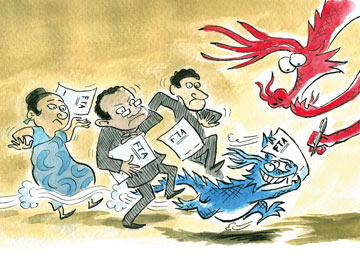Official denies ’black-box’ operation in China pact negotiations

CNA | 2014/04/23
Official denies ’black-box’ operation in China pact negotiations
By Elaine Hou
Taipei, April 23 (CNA) — No "black-box" operations were involved in negotiations over the trade-in-services agreement with China, a Taiwanese official told foreign officials Wednesday during a briefing on the controversial cross-strait pact.
The negotiations for the service trade agreement, as well as the negotiations for economic cooperation agreements with New Zealand and Singapore, were conducted by the Ministry of Economic Affairs, said Lin Chu-chia, deputy head of the Cabinet-level Mainland Affairs Council, at the briefing.
They were all conducted according to standard operating procedures, including consultations with industry and reports to lawmakers, Lin said in response to questions on the difference between the trade pact with New Zealand and the services trade pact with China.
Lin made the remarks during one of the two briefings organized by the Ministry of Foreign Affairs for foreign representatives and ambassadors based in Taiwan to help them learn more about the government’s stances on the service trade agreement and Taiwan’s free economic pilot zones.
The economic cooperation agreement with New Zealand was signed one month after the services agreement with China was inked in June 2013, Lin said.
There have been no complaints that the negotiations over the agreement with New Zealand lacked transparency, but some people have described the government’s dealing with the trade-in-services agreement with China as "black-box" operations carried out in secret, he added.
It had nothing to do with "black-box" operations, Lin said, ascribing the accusations to "China factors."
"I think that’s the key difference," he said.
Opponents of the pact are worried that it will hurt Taiwan’s interests and open the way for greater Chinese influence over the country. These concerns triggered a 24-day occupation of the Legislature by protesters that ended April 10.
China, which sees Taiwan as part of its territory, is said to be seeking to expand its economic influence over Taiwan in order to achieve eventual unification.
Jasmine Elise Huggins, St. Kitts and Nevis’ ambassador to Taiwan, asked about the possibility of re-negotiating just a certain particular article instead of withdrawing the entire pact.
In response, Cabinet spokesman Sun Lih-chyun said that this is a possibility but it would be "very difficult to isolate one single article" because the articles in the agreement are not independent from each other.
It would also be difficult to know whether China would agree to such a move, Sun said.
China, a major trading partner for Taiwan, accounts for 28 percent of the nation’s trade, Lin said.
In addition to improving trade ties with China, Taiwan’s other priorities are making efforts to join the proposed Trans-Pacific Partnership (TPP) and the Regional Comprehensive Economic Partnership trade blocs (RCEP), Lin added.
The TPP countries account for about 35 percent of Taiwan’s trade, while those in the RCEP occupy about 60 percent, Lin said.
The government has argued that passing the trade-in-services agreement with China is critical to opening the way for participation in other free trade blocs in the future, and that failure to pass it would hurt Taiwan’s credibility in seeking similar deals.





